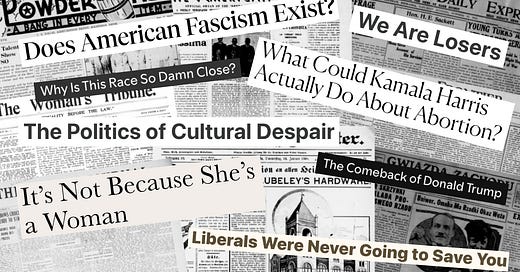Yesterday I wrote an essay about the election, sharing some of my immediate thoughts about what happened, and how I choose to interpret our current political moment. I didn’t add any concrete examples to any of what I wrote, speaking in somewhat vague terms, and that’s mainly because when I do add concrete examples, it takes a lot more time and I just wanted to get it out there immediately in case my words could help lower the temperature for some people. I can also see, however, that the piece could really be interpreted as a form of political bypassing if one doesn’t understand how much time I actually spend thinking about politics, geopolitics, economics, socio-cultural patterns, and the state of the world writ large and how much these things inform my worldview.
The piece pretty much focussed on two things: 1) that I made a conscious choice to not fear for this election, and 2) things are going to get worse no matter what. I am currently writing a very complicated piece that will elucidate #2, but for this newsletter, we’ll focus on #1.
Rather than opining about the actual politics behind this election, for the sake of brevity and timeliness, I thought instead I’d compile a bunch of essays, articles, videos, and podcasts that helped me understand this presidential election, before and after. I think it’s important to collect information on a wide range of topics, and create a mosaic of understanding from a lot of different angles. I consume political media from both sides of the political spectrum. That being said, I do have biases, however, as you’ll probably see by the left-leaning albeit independent slant of most of the media I’m presenting.
Regardless, by sharing these pieces, I’m not necessarily endorsing every word or making any definitive claims, but rather I’m just sharing them in case they are useful to any of you. Putting all of these things in context has helped shape my own political and emotional understanding of our current predicament, which I don’t think I’ll share in any great detail here only because I don’t know how useful it is for me to get super granular about a political landscape that is very much in flux, and might end up being a pretty seismic demographic shift that could transform politics in unpredictable ways. I’m also just not that adept at politics, and I ultimately think there are more important things for me to focus on.
I will say one thing briefly, however, because it goes more into a psycho-social realm, which I feel more comfortable talking about. I’ll suffice it to say that don’t think there is a stable or consistent left vs. right anymore. The coalitions are much more complex and intersecting in really strange ways today, and I think we might be in one of those historic points where the parties change shape altogether. I’m against identity politics on principle because I think it is a very mechanical way of categorizing individual, complex people, but particularly now, I think we’ll really, really misunderstand each other and this period of time if we try to reflexively categorize people the same way we did in 2016. Due to a lack of better language, however, I’m going to be using these terms below.
This maybe totally unhelpful, unnecessary, and worth ignoring for some people, but for others it might be useful to see someone soberly, calmly engaging with this sort of material, so I wanted to share.
The Failure of the Democratic Party
The following are pieces by various left-wing journalists and writers about the state of the Democratic party and how they lost the trust of the working class. These sentiments are also echoed by Bernie Sanders’ statement on Twitter, which I’m sure many of you have seen already.
Anyway, these writers below variously express how the party has been moving to the Right systematically since the 90s, and also how generally their strategies for mobilizing voters have failed.
This podcast below was also illuminating on this front, and honestly blew my mind, helping me understand something that I think really strangely animated this election: the revelation that most people (The Silent Majority) are actually more socially conservative and economically progressive, which is the opposite of conventional wisdom, and again complicates our notions of a clean right/left divide.
This podcast also goes into some of the failures of vision within the Democratic party, as well as explaining the demographic remixing and rebranding of the Right.
Another episode of Reflector, talking about the specter of World War III, the genocide in Gaza, and how they impact this current political cycle.
(Honestly, I’d just recommend Reflector in general. They have a great series on contested elections and also an episode on why politicians lie).
One moment of opining, for a treat: I think the democrats and liberals will do a real disservice to women if they perpetuate a narrative that Harris lost because she’s a woman. If they repeat ad nauseam that her sex cost her the election, and that America is too sexist for a woman to be president, they may make it so. (Or, more likely, the first woman president will be a Republican).
What A President Can Actually Do
This video explains a lot of the minutiae around what a president is actually capable of achieving once in office, namely how they have a disproportionate influence on geopolitics relative to the other branches of government.
This article helped me understand what Harris could actually do about abortion access if she won, which turns out, would be very little without a Democratic majority in both the House and the Senate.
The video below explains how the way we do politics now causes presidential candidates to make promises they can’t possibly keep on the campaign trail, leading to broader dissatisfaction amongst voters. Chapman also goes into the truly horrendous job of the president, explaining why the leaders we desire would never in a million years run for president.
On Fascism
Fascism is a word that is thrown around flippantly to our peril. The word has a specific meaning, and I really think we ought to use it properly. This New Republic article by Daniel Bessner explains how we’ve come to use that word as a catch-all curse word, and how what we’re seeing more from parts of the extreme-right is more accurately described as xenophobic, nationalistic populism than actual fascism, and that using the term fascism actually might allow us to distance ourselves from the “genocidal racism, rapacious militarism, and a violent obsession with incarcerating minorities” that existed in America long before the term existed (not to mention how our current usage of the term has a strange way of retconning George W. Bush, whose policies aligned a lot more with Nazism). For more contextualization, I’d really recommend watching Ryan Chapman’s video explaining what fascism is, because even in Europe it was never as simple as “the extreme right-wing” of a political spectrum.
You can also hear Bessner talking about his piece on Ana Kasparian’s podcast, Unaligned. Here he also touches on how the explosion of the term fascist to refer to Trump is a signal of liberalism’s decline.
Psychologically Speaking
I love This Jungian Life, so here’s a good one that generally describes the role of cultural complexes and psychic factors on the political world. I think the way we, as a culture, generally view everything is extremely mechanistic and simplistic, so I always enjoy adding the layer of the psyche onto my analysis of any given topic because it allows me to have a much broader aperture. I also don’t think psyche can be separated from ecology, geopolitics, economics, or anything else that humans have a role in. I’m allergic to trite slogans in politics, so I always appreciate the mythic lens through which these hosts understand and articulate the world.
Anyway, that’s all from me. This is a non-exhaustive list and by far doesn’t cover everything (still waiting for Ryan Chapman’s video on Project 2025, for instance)— just some of the things in the past months and days that I’ve found instructive. I hope this was helpful.
A Couple More Things
Some things that were published after I posted:
Great discussion here about how the liberals destroyed the populist left and will now have to figure out how to rebuild and regain the trust of the working class.
Paul Kingsnorth reposted an essay from 2022, which has even more salience today, talking about the inversion he’s witnessed in politics, and hints at the peculiar pattern of former anti-globalization leftists finding a strange home within the populist right.
A piece just dropped from The Black Sheep. I’ll share a quote: “Will we let this outcome dictate our lives and outlook for the next four years or will we choose to reclaim our individual sovereignty, playing our part in crafting the life and world we long for—regardless of who is president?” Or two: “This is where we can either lean back in despair, lean back because our savior is here, or leap forward into a life we consciously craft for ourselves and our communities.” Yup.
Thank you for your attention. If you’d like to support the project and gain access to future full podcasts, essays, and videos without ads, and be able to comment on posts, please consider becoming a paid subscriber or joining us on Patreon for as little as $5 a month.















